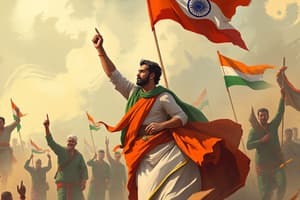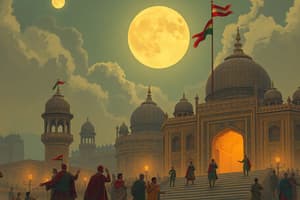Podcast
Questions and Answers
What was a key reason behind the American Revolution?
What was a key reason behind the American Revolution?
- Providing representation in the British Parliament
- Imposing heavy taxes on the colonies (correct)
- Increasing trade benefits for the colonies
- Promoting peace and harmony with the British Crown
Which core values sparked the French Revolution?
Which core values sparked the French Revolution?
- Monarchy, aristocracy, and dictatorship
- Feudalism, serfdom, and dictatorship
- Monopoly, capitalism, and communism
- Liberty, equality, and fraternity (correct)
What was a significant outcome of the French Revolution?
What was a significant outcome of the French Revolution?
- The strengthening of feudalism in France
- The rise of a dictatorship under Louis XVI
- The establishment of an absolute monarchy
- The fall of the Bourbon monarchy (correct)
What was the main goal of the Indian Independence Movement?
What was the main goal of the Indian Independence Movement?
Which phrase became a rallying cry during the American Revolution?
Which phrase became a rallying cry during the American Revolution?
Who was the iconic figure associated with the Civil Rights Movement in the United States?
Who was the iconic figure associated with the Civil Rights Movement in the United States?
Which movement aimed to end racial segregation in the United States?
Which movement aimed to end racial segregation in the United States?
What inspired the Indian Independence Act of 1947?
What inspired the Indian Independence Act of 1947?
Which movement contributed to the fall of the Berlin Wall and the collapse of the Soviet Union?
Which movement contributed to the fall of the Berlin Wall and the collapse of the Soviet Union?
What was the significance of Mohamed Bouazizi's suicide in Tunisia?
What was the significance of Mohamed Bouazizi's suicide in Tunisia?
Study Notes
Unfolding the Freedom Struggle through History
Throughout human history, the pursuit of freedom has been a universal theme, driving people to challenge the status quo, resist oppression, and strive for a better world. In this exploration, we'll delve into some significant episodes of the freedom struggle, spanning various regions and periods, with a focus on the human spirit's unwavering determination to break free.
American Revolution (1765-1783)
The American Revolution marked the birth of the United States and a rejection of the oppressive British government. Colonists were driven to rise up against the British Crown for reasons such as taxation without representation and increasing military presence. The battle cry of "No taxation without representation" became a cornerstone of the freedom struggle in the New World.
French Revolution (1789-1799)
Sparked by the ideals of liberty, equality, and fraternity, the French Revolution was an uprising against the monarchy and aristocracy. Citizens took to the streets demanding change, leading to the fall of the Bourbon monarchy, the execution of King Louis XVI, and the Reign of Terror. The Revolution's main objective was to break the shackles of feudalism and establish a modern democracy.
Indian Independence Movement (1857-1947)
The Indian Independence Movement fought against British rule and sought to establish an independent India. Inspired by the ideas of non-violent resistance and civil disobedience, Mahatma Gandhi and other leaders led a peaceful campaign against the British government. The movement culminated in the Indian Independence Act of 1947, which divided the country into India and Pakistan.
Civil Rights Movement (1950s-1960s)
The Civil Rights Movement aimed to end racial segregation and discrimination in the United States. Led by iconic figures such as Martin Luther King Jr., Rosa Parks, and Malcolm X, the movement employed non-violent direct action methods, marches, and protests, ultimately resulting in the passage of the Civil Rights Act of 1964 and the Voting Rights Act of 1965.
Solidarity Movement (1980s)
The Solidarity Movement was a social movement that aimed to end the communist dictatorship in Poland. Founded by Lech Wałęsa, the movement organized a general strike in August 1980, claiming 10 million participants, and later pressured the government to acknowledge the workers' rights. The movement contributed to the fall of the Berlin Wall and the collapse of the Soviet Union.
The Arab Spring (2010-present)
The Arab Spring was a series of revolutionary movements that spread across the Middle East and North Africa. It started in Tunisia as a response to the suicide of Mohamed Bouazizi, an unemployed street vendor, and quickly spread to other countries, inspiring citizens to demand better governance, human rights, and an end to dictatorship. The Arab Spring has had a significant impact on the region's political landscape.
The freedom struggle is an ongoing process, with new battles being fought for liberty and justice. This brief overview of significant episodes in history reveals the resilience of the human spirit, the power of collective action, and the importance of standing up for what we believe in. The freedom struggle is not just a part of our past, but an essential component of our present and future.
Studying That Suits You
Use AI to generate personalized quizzes and flashcards to suit your learning preferences.
Description
Delve into key moments in the history of freedom struggles worldwide, from the American Revolution to the Arab Spring. Learn about the motives, leaders, and impacts of movements that challenged oppression and fought for liberty, justice, and human rights.




